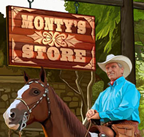While she was away, my hubby's very sweet mare who never spooks and seemed just a happy plod despite being 4, started spooking, leaping forward while he was riding her just round the yard & paddocks. She seemed to settle after he just put her on small circles and made her work. We do have a miniature that kept her company while the other one was away. We went out for a short ride last night and and thank goodness my mare was good because hubbys horse was just terrible, spooking, leaping forward and generally being really difficult and we cut the ride really short. I did take her in the round pen when we got back and where she normally is really attentive and easy to work, she was very distracted.
I have read back over really old posts and wanted opinions on whether this could have been because my horse, who is the lead mare, went away and she had to cope with being the leader??? Any thoughts welcomed!




Horses rely so much on herd activity, all horses have the potential to lead and each time the circumstances change within a field the horses have to sort themselves out. Even leaving the field for a few hours it changes what the horses have to do in the herd, big or small.
I have been studying herd activity since 2013 first thing when there are big changes to the herd is to sort out the rankings, this can take either a few hours, a few days or even a few weeks depending on the circumstances. If the horses are not settled between themselves then when working them they 'misbehave*' or still try and sort out rankings when being worked. It is what we do that can either add to it or help resolve it.
Horses create great bonds with each other, so when one goes away for training and comes back again, they both have to sort things out again. Very much like when we go on holiday from work, when we get back everything seems different. To others, nothing changes because small changes happen daily, but because we have been away for a couple of weeks we notice changes. The same with the horses, they notice things that are different and horses that were once lower in the rankings may have had to change their viewpoint and become a leader, when the main leader comes back they have to decide who now is hierarchy. It is not just rankings however, consider what the horse thinks, its leader suddenly vanishes they do not know where it has gone nor comprehend that it might be coming back, the new circumstances for the horse for some can be difficult for them to handle especially if they are not naturally a lead horse.
I liken this to leaving our teenagers at home to go on holiday or a weekend getaway without them, for the first time they might be nervous, but they know we are coming back in a couple of days so they handle it. Say though we just went off without warning, we did not call them, we did not tell them where we were, how would the teenagers cope then, are we coming back, what has happened, where are we. In the horse world this is what happens to the horses, one moment they are with their herd family, then when one goes away for a few weeks training initially the horses response is panic maybe even bellowing for a few days, then they start to settle to the new life without the horse that has gone away, they do not know where they have gone, they do not know they are coming back. When that horse comes back nothing is the same as it was before. The horse that went away has had new experiences and the horse that was left behind had new experiences, both horses now have different views.
Might I suggest that you take both horses into the schooling arena in hand and walk and trot them around, but take it in turns in the lead, overtaking each other within safe distance until they both relax down into a relaxed walk. Make it fun and not strict. Once they start to settle, change the routine to help them to work together again, figure 8, poles etc. Encourage them to work together, so they know and trust each other again when out and about.
* I strongly believe that horses do not misbehave, cheeky maybe, but not thoughtful misbehaviour and being reactive creatures only respond to the stimulus around them. When seemingly misbehaving we have to look at everything around them, including our own handling. Horses sometimes wish to say No too, for whatever their reason and it is at that point if we do not listen to what they are trying to say that the seemingly misbehaving starts. Stepping back and seeing what the horse is saying is always good, sometimes a good itch on the withers is all they need.
Mel
x
Thanks for your comments, really appreciate your insights into herd activity and makes lots of sense. Perhaps I should have put change in behavior rather than misbehaving :) We will certainly work on your suggestions and see how things go. I'm sure everything will settle down and once we give them a bit more time.
Karen
Changes in behaviour sounds good :D
Let us know how you get on.
Mel
x
All the best
Bud
As for being in season, it's certainly something we will keep an eye on as we get to know them. I've had horses for a number of years but always on livery, this is hubbys first horse and to have them on our own yard at last is just amazing to sit and watch them!
What an interseting thread this has become!
Good things have been suggested, you and your husband seem to have a great approach.
What might help you overcoming these behavioral challenges once and for all, is so very well described in Monty's book 'From My Hands To Yours'. You'll find in Chapter 10, page 194 help for 'barn-sour' or 'home-sour' horses, and seperation-anxiety.
The intrinsic approach is the key to the horse learning to 'want' to do as you ask, not being 'made' to do so...
I'm really looking forward to reading how you're progressing with your two young horses, there's so much to learn!
Keep the good work going!
Miriam